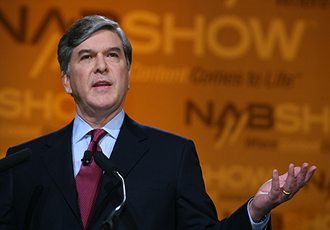NAB President and CEO Gordon Smith, in an interview ahead of the NAB Show, says he’s focused on figuring out the potential shortfall in repacking reimbursement, defending retransmission-consent rights and encouraging participation in talks over the ATSC 3.0 standard. “A successful auction should not mean a diminished video future for the American people,” Smith says. Federal Communications Commission Chairman Tom Wheeler’s “theme is competition, competition, competition. Broadcasting is very central to that.”
With the NAB convention in Las Vegas set to get underway in Las Vegas this weekend, Smith took time to discuss these key challenges with TVNewsCheck Editor Harry A. Jessell, providing reassurance they are being well met at the NAB.
An edited transcript courtesy of http://www.tvnewscheck.com/:
For five years, the NAB ignored the reverse auction that the FCC would use to buy spectrum from broadcasters. Now, it is actively engaged in making sure the rules of that auction work for broadcasters? What turned you around?
The best answer is that the NAB represents the interest of its members. That interest evolved after the $45 billion [of the AWS-3 auction] and we were asked to facilitate both the forward and the reverse sides of the auction to make sure that our members get the very best possible insight into the auction and come out with the best opportunities for their companies.
We respect the fact that many of our members have earnings calls to make and boards of directors to which they answer and return on investment that they need to secure. Now what that means is, many will look [at the auction], some will participate and a few will sell.
Our instruction from our board is to be helpful on the reverse auction, while we protect the industry on the other side of the auction for those who wish to remain in [the broadcasting] business.
When you say “a few will sell,” are you anticipating that this incentive auction will not be a success from the FCC’s perspective?
I think that depends entirely on the numbers that ultimately are brought to the table and that’s something that is sort of all over the board. You know, there’s the Greenhill report and then there is an effort by one group of broadcasters to try to further inflate those numbers, but in the end the deals will be done based on economic self-interest and that will be determined by the amount of money being offered.
So you’re not ready to make a prediction about how the auction will go?
I really am not. There are still many shoes to fall having nothing to do with us, but having everything to do with the participants on the buying and the selling sides, with their being simplified as opposed to complicated auction rules, and then with the physical mechanics of repacking. That is an enormous challenge. The timing of when deals will be done, when dollars will be exchanged and when the spectrum is conveyed is entirely out of our hands and is subject to all kinds of practical problems
Let’s suppose that the FCC does get 86 MHz or 120 MHz. How does that change the business? Have you thought about that at all?
I am thinking about it almost nonstop. As I understand economics, that which is in shorter supply is often of higher value. It will be a smaller industry, but if we do our jobs, it can mean that we are a more important industry because the supply of localism and of broadcasting will be smaller. We will be ever more important to our nation at the civic level, at the entertainment level, at the political level, you name it. I think the remaining industry will enjoy great value.
So if the demand stays pretty much the same and supply goes down, what’s left is then that much more valuable?
Read more at tvnewscheck.com.


